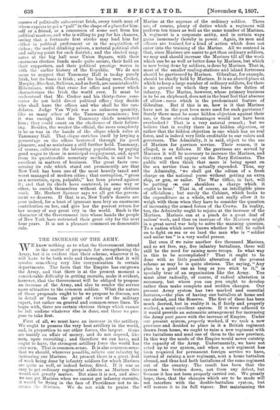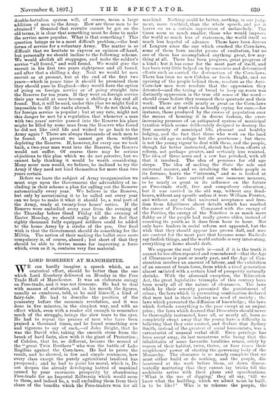THE INCREASE OF THE ARMY.
WE know nothing as to what the Government intend in the matter of proposals for strengthening the Army, but it is evident that their scheme, whatever it is, will have to be both wide and thorough, and that it will involve something very like reorganisation hi certain departments. The facts that the Empire has outgrown the Army, and that there is at the present moment a considerable difficulty in getting recruits, make it evident, however, that the Government will be obliged to propose an increase of the Army, and also to render the service more attractive to the common soldier. What the nature of these proposals ought to be we propose to discuss, not in detail or from the point of view of the military expert, but rather on general and common-sense lines. To begin with, there are certain obvious things which cannot be left undone whatever else is done, and these we pro- pose to take first.
First of all, we must have an increase in the artillery. We ought to possess the very best artillery in the world, and, in proportion to our other forces, the largest. Guns are mainly an affair of money, and do not depend, like men, upon recruiting ; and therefore we can have, and ought to have, the strongest artillery force the world has ever seen. That is common-sense. It is also common-sense that we should, wherever possible, relieve our infantry by increasing our Marines. At present there is a great deal of work being done by infantry soldiers for which Marines are quite as well, or indeed better, fitted. If it was as easy to get ordinary regimental soldiers as Marines this would not greatly matter. But since it is not, and since we can get Marines when we cannot get infantry recruits, it would be flying in the face of Providence not to in- crease the Marines. We do not wish to praise the Marine at the expense of the ordinary soldier. There are, of course, plenty of duties which a regiment will perform ten times as well as the same number of Marines. A regiment is a corporate entity, and in certain ways gains immensely thereby in power. Again, its men and officers are trained for a, kind of action which does not enter into the training of the Marine. All we contend is that, since Marines are easier to get than ordinary soldiers, we may and should increase the Marines till all the work which can be as well or better done by Marines, but which is now being done by soldiers, is done by Marines. That is, most of the smaller coaling-stations and island fortresses should be garrisoned by Marines. Gibraltar, for example, should be chiefly held by Marines. It is an absurd place at which to keep a large number of ordinary soldiers, for there is no ground on which they can learn the duties of infantry. The Marine, however, whose primary business is to be on shipboard, does not in the least feel that absence of elbow - room which is the predominant feature of Gibraltar. But if this is so, how is it that Marines have not in the past been more used for such garrisons ? Surely there must be some hidden objection against their use, or these obvious advantages would not have been overlooked ? That is a very natural remark ; but we believe that in reality there is no hidden objection, or rather that the hidden objection is one which has no real force, and is indeed very little creditable to our rulers and governors. The Admiralty, it is said, object to the use of Marines for garrison service. Their reason, it is alleged, is as follows. If the garrisons are served by Marines it will be necessary to increase the Marines, and the extra cost will appear on the Navy Estimates. The public will then think that more is being spent on the sea service than is actually expended. Thus, say the Admiralty, we shall get the odium of a fresh charge on the national purse without getting an extra ship, or gun, or sailor. The War Office, in fact, will be putting oil our shoulders a charge which it ought to bear.' That is, of course, an intelligible piece of officialism ; but surely the Cabinet, which looks to the expenditure as a whole, will not really allow it to weigh with them when they have to consider the question of increasing the armed forces of the Crown. In reality, too, the Admiralty ought to rejoice at the increase of the Marines. Marines can at a pinch do a great deal of sailors' work, and thus an increase of the Marines might in a. great naval war help to solve the manning question. To a nation which never knows whether it will be called on to fight on sea or on land the man who is "soldier and sailer too "is a very useful person.
But even if we raise another five thousand Marines, and so set free, say, five infantry battalions, there will still be the need for raising more troops. In what way is this to be accomplished ? That it ought to be done with as little possible alteration of the present scheme as may be is quite obvious. The saying, "Any plan is a good one as long as you stick to it," is specially true of an organisation like the Army. You must alter radically, of course, if radical alteration is necessary, but where you can you ought to develop rather than make complete and sudden changes. Our present Army system has two marked and essential features,—the plan of having one battalion at home and one abroad, and the Reserve. The first of these has been much decried, but in reality it is, if fairly and properly worked, a most excellent system. If it were adhered to it would provide an automatic arrangement for increasing the Army uari passu with the increase of Empire. -Under our present system, properly worked, if we took a new province and decided to place in it a British regiment drawn from home, we ought to raise a new regiment with two battalions and send one of them to the new province. In this way the needs of the Empire would never outstrip the capacity of the Army. Unfortunately, we have not acted up to our system, and when a new regiment has been required for permanent foreign service we have, instead of raising a new regiment, sent a home battalion abroad, and thus had both battalions of the same regiment out of the country. The result has been that the system has broken down, not from any defect, but because it has not been properly carried out. We greatly hope, then, that the changes which are to be made will not interfere with the double-battalion system, but will restore it to its full vigour. But maintaining the double-battalion system will, of course, mean a large addition of men to the Army. How are these men to be obtained ? Granted that recruits cannot be got on the old terms, it is clear that something must be done to make the service more popular. What is that something ? This question brings us to a most difficult problem,—the best terms of service for a voluntary Army. The matter is so difficult that we hesitate to express an opinion off-hand, but personally we should incline to the following scheme. We would abolish all stoppages, and make the soldier's service "all found," and well found. We would give the recruit in his first two years eightpence and all found, and after that a shilling a day. Next we would let men recruit as at present, but at the end of the first two years—which in peace time it should be promised them they should pass in England—they would have the option of going on foreign service or of going straight into the Reserve for ten years. If they went on foreign service their pay would at once become a shilling a day and all found. But, it will be said, under this plan we might find it impossible to fill the ranks abroad. We do not think so, for foreign service is popular ; but at any rate, might not this danger be met by a regulation that whenever a man with two years' service passed into the Reserve his place might be filled by some man from the Reserve who found he did not like civil life and wished to go back to the Army again ? There are always thousands of such men to be found. At present we cannot get them without depleting the Reserve. If, however, for every one we took back, a two-year man went into the Reserve, the Reserve would not suffer. Of course there may be serious objections to this plan which we do not perceive, but we cannot help thinking it would be worth considering. Many more men would, we believe, be inclined to try the Army if they need not bind themselves for more than two years certain.
Before we leave the subject of Army reorganisation we must urge upon the Government the advisability of in- cluding in their scheme a plan for calling out the Reserve automatically every year. We believe in the Reserve, but only by accustoming it to be called out every year can we hope to make it what it should be, a real part of the Army, ready at twenty-four hours' notice. If the Reserve were embodied every year from the evening of the Thursday before Good Friday till the evening of Easter Monday, we should really be able to feel that eighty thousand fully equipped soldiers could be added to the home Army by a stroke of the pen. Our final wish is that the Government should do something for the Militia. The notion of their making the ballot once more compulsory is, of course, absurd ; but short of that they should be able to devise means for improving a force which, even as it is, contains very fine material.























































 Previous page
Previous page